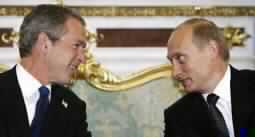HIGHLIGHTS: 'Iran May View Russia as an Enemy at Sometime,' Says Bush||Russia Also Ill at Ease With Washington's Shrill Attacks on Iraq||Accord Would Cut RussianU.S. Long-range Nuclear Warheads By Two Thirds Over Next Decade||STORY: Russian leader Vladimir Putin and President Bush signed a landmark treaty on Friday to slash their long-range nuclear warheads by two-thirds, with both men hailing the event as historic. (Read photo caption)
But their summit, Bush's first on Russian soil, was overshadowed by U.S. concerns over a nuclear power plant Russia is building in Iran which Washington says could put weapons of mass destruction into the hands of a state it accuses of sponsoring terrorism.
"We are going to cast aside all doubts and suspicions and welcome a new era of relations," Bush said in a televised face-to-face meeting with Putin shortly before the signing ceremony in the elegant Kremlin fortress.
The Treaty of Moscow, the centerpiece of the four-day summit which began on Thursday evening, will commit the former Cold War adversaries to cutting their arsenals to between 1,700 and 2,200 warheads by the year 2012. The two nuclear giants currently hold about 6,000 warheads each.
The pact, the first nuclear disarmament pact between the former superpower rivals since January 1993, is expected to set the seal on Russia's shift to a more pro-Western foreign policy.
The two also signed a declaration to forge a new strategic relationship.
However, analysts say the pact smacks of outdated superpower rivalry and is barely relevant to the fight against terrorism which Bush and Putin both see as the new global threat after the September 11 airliner attacks in New York and Washington.
IRAN IRAQ WORRIES
But even before Bush touched down on his first visit to Russia, the dispute over Moscow's nuclear technology cooperation with Iran had returned to haunt the relationship.
Bush has described Iran, Iraq and North Korea as forming an "axis of evil."
In Berlin, Bush suggested at a news conference that Moscow was contributing to weapons' proliferation for helping Iran build a nuclear power plant at Bushehr.
"Russia needs to be concerned about proliferation into a country that might view them as an enemy at some time and if Iran gets a weapon of mass destruction deliverable by a missile, that's going to be a problem...for all of us, including Russia," Bush said.
In Moscow, Foreign Minister Igor Ivanov immediately rejected the U.S. fears as groundless.
"Russia is firmly loyal to the non-proliferation of weapons of mass destruction," he told an NTV television chat show.
"Yes, we are taking part in building the nuclear power station in Iran, but I wish to stress that this power plant is under the control of the International Atomic Energy Agency, an international organization," he said.
Russia is also ill at ease over the Bush administration's increasingly shrill attacks on Iraq, with whom Moscow has close economic ties.
Asked what Moscow's attitude would be if the United States did finally launch military strikes on Saddam Hussein, Ivanov replied: "Russia is against this and Russia is doing everything to prevent such an operation beginning."
Hours before Bush arrived in Moscow, about 300 people protested outside the U.S. embassy in Moscow, burning the American flag and denouncing Bush. But the protests were small compared with the Berlin demonstrations, which brought thousands out on to the streets.
Bush and Putin hold a joint news conference after signing the Treaty of Moscow arms agreement, go on a walking tour of the Kremlin and then end the day with dinner at Putin's residence.
On Saturday, Putin takes his American guest to St. Petersburg, the old imperial capital, where Bush will tour cultural spots and meet university students.
Bush flies on to Paris on Sunday, but will meet up with Putin again next Tuesday at a NATO-Russia summit in Rome at which Russia will be given a role in some alliance decision-making.
PHOTO CAPTION
President George W. Bush meets with Russian President Vladimir Putin (R) in the Kremlin May 24, 2002. The two leaders will today sign a landmark arms control treaty reducing their nuclear weapons by one-third. (Kevin Lamarque/Reuters)
- Author:
& News Agencies - Section:
WORLD HEADLINES


 Home
Home Discover Islam
Discover Islam Quran Recitations
Quran Recitations Lectures
Lectures
 Fatwa
Fatwa Articles
Articles Fiqh
Fiqh E-Books
E-Books Boys & Girls
Boys & Girls  Ramadan
Ramadan Fatwa Audios
Fatwa Audios Month of Mercy
Month of Mercy Women
Women Eed Al- Fitr
Eed Al- Fitr Food Recipes
Food Recipes Videos
Videos

 Prayer Times
Prayer Times












